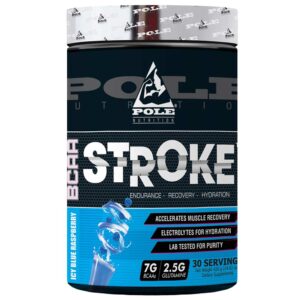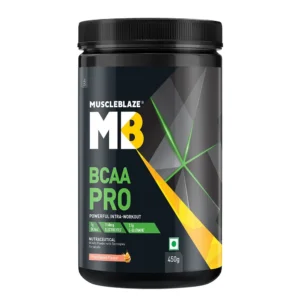What is BCAA?
BCAA stands for branched-chain amino acids. BCAAs are a group of three essential amino acids: leucine, isoleucine, and valine. These amino acids are called “branched-chain” because of their chemical structure, which is characterized by branches off the main chain of atoms.
BCAAs are important for various physiological processes in the body, including the synthesis of proteins and the production of energy. They are also important for the maintenance of muscle mass and the regulation of muscle protein metabolism.
BCAAs are found in protein-rich foods such as meat, poultry, and dairy products, as well as in some plant-based sources such as soy and quinoa. BCAAs are also available in supplement form and are often taken by athletes and bodybuilders to support muscle building and recovery. However, it’s important to note that more research is needed to fully understand the potential benefits of BCAA supplements, and they are not a substitute for a healthy, balanced diet.
Benefits of BCAA (Branched-Chain Amino Acids)
There are several potential benefits of consuming branched-chain amino acids (BCAAs):
Supporting muscle growth and repair: BCAAs, particularly leucine, are important for the synthesis of proteins and the repair and maintenance of muscle tissue.
Reducing muscle soreness: Some studies have suggested that BCAA supplements may help reduce muscle soreness and fatigue after exercise.
Improving exercise performance: BCAAs may help improve exercise performance, particularly in people who are protein- or amino acid-deficient.
Reducing muscle breakdown: BCAAs may help reduce the breakdown of muscle protein during exercise, which can help preserve muscle mass.
Enhancing immune function: Some BCAAs, such as valine, are important for the production of antibodies and the maintenance of immune function.
Improving mental health: Some research suggests that BCAAs, particularly tryptophan, may have a role in the production of neurotransmitters that regulate mood and behavior.
It’s important to note that more research is needed to fully understand the potential benefits of BCAAs and that BCAA supplements are not a substitute for a healthy, balanced diet.
How to consume BCAA (Branched-Chain Amino Acids)
There are several ways to consume branched-chain amino acids (BCAAs):
Through the diet: One of the best ways to consume BCAAs is through a varied and balanced diet that includes a variety of protein-rich foods. Some good sources of BCAAs include:
Meat, poultry, and fish
Eggs
Dairy products
Legumes, such as beans and lentils
Nuts and seeds
Tofu and other soy-based products
Through supplements: BCAA supplements are also available in powders, capsules, or tablets. These supplements can be taken alone or added to smoothies, protein shakes, or other beverages. It’s essential to follow the dosage instructions on the product label, as overconsumption of amino acids can be harmful.
Through fortified foods: Some foods, such as cereals and protein bars, are fortified with BCAAs to provide an additional source of these nutrients.
It’s important to note that while BCAA supplements can be a convenient way to increase your intake of these nutrients, they are not a substitute for a healthy, balanced diet. It’s best to get your nutrients from whole, unprocessed foods whenever possible.
Frequently Asked Questions(FAQs)
What is the ideal ratio of BCAA?
The ideal ratio of branched-chain amino acids (BCAAs) varies depending on the individual’s needs and goals. The three BCAAs are leucine, isoleucine, and valine, and they are typically consumed in ratios ranging from 2:1:1 to 10:1:1, with leucine being the most abundant.
The most common ratio of BCAAs is 2:1:1, which means that the supplement contains twice as much leucine as isoleucine and valine combined. Some studies have suggested that this ratio may be effective for promoting muscle protein synthesis and reducing muscle damage during exercise.
However, it’s important to note that more research is needed to determine the optimal ratio of BCAAs for different individuals and purposes. It’s also important to keep in mind that BCAA supplements are not a substitute for a healthy, balanced diet and should not be used as a replacement for whole, unprocessed protein sources.
Can BCAA supplements be consumed by vegans?
Yes, branched-chain amino acid (BCAA) supplements can be consumed by vegans. BCAAs are found in a variety of plant-based protein sources, including legumes, nuts, and seeds. Vegan BCAA supplements are also available in the form of powders, capsules, or tablets and are typically made from fermented plant-based sources such as corn, peas, or rice.
It’s important to note that while BCAA supplements can be a convenient way to increase your intake of these nutrients, they are not a substitute for a healthy, balanced diet. It’s best to get your nutrients from whole, unprocessed foods whenever possible. If you are considering taking BCAA supplements, it’s a good idea to consult with a qualified healthcare professional or a registered dietitian to determine the appropriate dosage and to ensure that your nutritional needs are being met.
Which is better- BCAAs or L-Leucine?
It’s difficult to determine which is better between branched-chain amino acids (BCAAs) and L-leucine, as it depends on the individual’s needs and goals. BCAAs are a group of three essential amino acids: leucine, isoleucine, and valine. L-leucine is one of the three BCAAs and is the most abundant of the three.
BCAAs are important for a variety of physiological processes in the body, including the synthesis of proteins and the production of energy. They are also important for the maintenance of muscle mass and the regulation of muscle protein metabolism. L-leucine is considered to be the most important of the BCAAs for muscle protein synthesis, and it is often the focus of research on the effects of BCAAs on muscle growth and repair.
In general, BCAAs may be more beneficial for those who are looking to support muscle growth and repair, while L-leucine may be more beneficial for those who are specifically interested in increasing muscle protein synthesis. However, it’s important to note that more research is needed to fully understand the potential benefits of BCAAs and L-leucine and that these supplements are not a substitute for a healthy, balanced diet.


